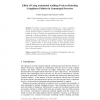Free Online Productivity Tools
i2Speak
i2Symbol
i2OCR
iTex2Img
iWeb2Print
iWeb2Shot
i2Type
iPdf2Split
iPdf2Merge
i2Bopomofo
i2Arabic
i2Style
i2Image
i2PDF
iLatex2Rtf
Sci2ools
BPM
2009
Springer
2009
Springer
Effect of Using Automated Auditing Tools on Detecting Compliance Failures in Unmanaged Processes
The effect of using automated auditing tools to detect compliance failures in unmanaged business processes is investigated. In the absence of a process execution engine, compliance of an unmanaged business process is tracked by using an auditing tool developed based on business provenance technology or employing auditors. Since budget constraints limit employing auditors to evaluate all process instances, a methodology is devised to use both expert opinion on a limited set of process instances and the results produced by fallible automated audit machines on all process instances. An improvement factor is defined based on the average number of non-compliant process instances detected and it is shown that the improvement depends on the prevalence of non-compliance in the process as well as the sensitivity and the specificity of the audit machine. Topics covered: BPM Governance and Compliance; Management Issues and Empirical Studies; Non-traditional BPM Scenarios.
| Added | 25 May 2010 |
| Updated | 25 May 2010 |
| Type | Conference |
| Year | 2009 |
| Where | BPM |
| Authors | Yurdaer N. Doganata, Francisco Curbera |
Comments (0)

